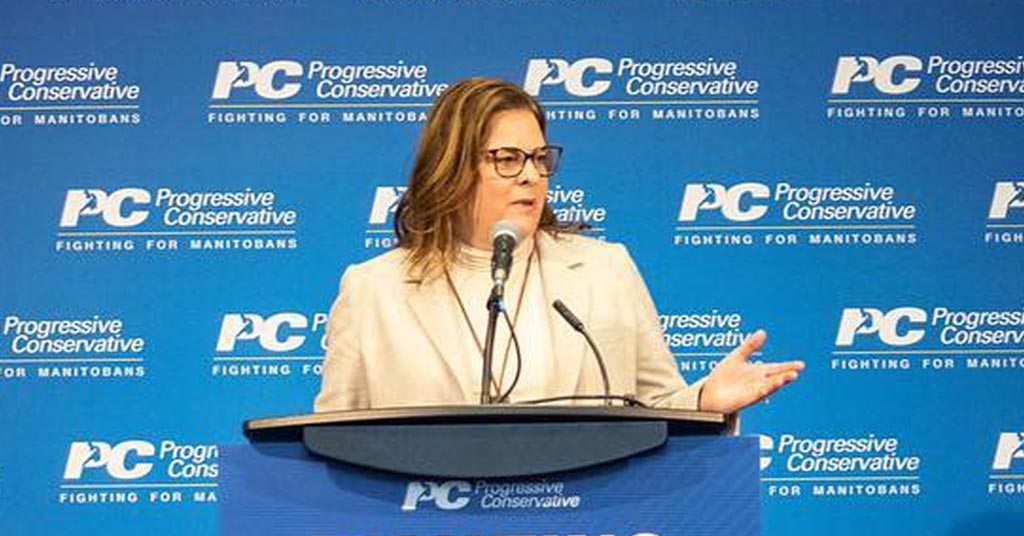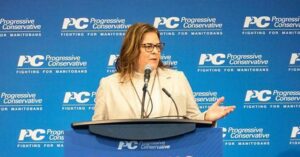
Manitoba PC’s ‘Anti-Union’ Labour Record Marked by Chaos, Division and Strikes, Experts Say
“Stefanson's approach hasn't been qualitatively different than Pallister's”
The Manitoba PC’s record on labour issues is “strongly anti-union” and has fostered chaos, division and unrest as thousands of Manitobans have gone on strike over the last several years, experts say.
“The government was looking to go to battle with unions,” Niall Harney, Senior Researcher for the Canadian Centre for Policy Alternatives Manitoba, told PressProgress.
“If you speak to any worker in the provincial civil service or in health care, or at a Crown Corporation, I think they will tell you that they don’t feel that their paychecks have been growing because of this government’s relationship with them,” Harney said.
“This has exacerbated strike activity and created labour unrest across the province.”
Years of Wage Freezes for Workers
One of the PC’s earliest attacks on workers was 2017’s “draconian” wage freeze legislation called the Public Services Sustainability Act covering 110,000 public sector workers. The PSSA legislated two years of 0% wage increases followed by a 1.75% increase over two years. While the PSSA was later repealed after lengthy court battles, the damage was done as many unions either took the wage freezes or went years with expired contracts fighting it.
Since the pandemic, the PCs have used mandate letters to freeze public sector wages at 2% annually. These consecutive wage freezes have caused widespread frustration and resulted in overwhelming strikes votes and several massive strikes involving thousands of workers.
“The strike at the U of M probably would have been averted had there not been wage mandate set by the government,” Harney said. “And these two strikes with MGEU, the Liquor and Lottery strike and the MPI strike, would probably be averted without wage mandates being set by the province.”
Nearly five years of wage freezes demanded by Manitoba’s Progressive Conservatives have harmed the University of Manitoba’s reputation.
This week, the government demanded another wage freeze.https://t.co/fW6oaft87A #mbpoli #UMFA2021
— PressProgress (@pressprogress) October 8, 2021
Currently, 1,700 Manitoba Public Insurance workers are on strike and have asked Manitoba Premier Heather Stefanson to lift the wage freeze mandate and allow MPI to offer wage increases above 2%. In a video, Stefanson responded, “Sometimes the answer just has to be no.”
David Camfield, a labour professor at the University of Manitoba, told PressProgress that “Stefanson’s approach hasn’t been qualitatively different than Pallister’s.”
Camfield also noted the PC government was penalized for its 2016 interference in the U of M bargaining and forced to pay the union $19.4 million in damages for lost wages and the cost of the 2021 strike.
Health Care Bargaining Chaos
Another early Manitoba PC attack on workers was when the government forced health care workers to vote for new unions in order to reduce the number of bargaining units, pitting health care unions against each other to compete for workers’ votes.
“The forced votes…pitted union against union in a way that was divisive in workplaces and made union staff and activists devote time on inter-union competition,” Camfield explained.
In addition to creating “general confusion” and “all sorts of chaos between different unions,” Harney noted that many health care workers were forced to go extended periods of time with expired contracts well into the pandemic.
“What we did see in health care, in those specific sectors, home care and long term care, was that bargaining just went on for such a long time that workers were going without a contract for many, many years,” Harney said.
“Many have not received pay increases,” Harney added. “Many of those workers were forced to work without a contract throughout the entire pandemic which has a huge effect on the mental health of workers and on the quality of jobs.”
Barriers for Workers Who Want to Unionize
One of the first things the Manitoba PCs did in office was make it harder for workers to join a union.
The Manitoba PCs eliminated single-step unionization, known as “card check certification,” in favour of a longer, two-step process. Single-step unionization allows a workplace to be unionized if the majority of workers sign a union card. Two-step unionization adds a second secret-ballot vote which lengthens the union drive. Unions oppose the two-step process because it gives the employer more time to interfere in the union drive.
Harney says eliminating card-check was “the first direct attack on unionization efforts in the province” as single-step certification is “hugely important to organizing drives across the country.”
The British Columbia Labour Relations Board recently found that single-step certification increased unionization applications by 60%, with 87% of those applications resulting in certification.
Making Construction Work More Unsafe
In 2020, the Manitoba PCs quietly amended a labour law that made construction work more unsafe. The PC’s law allowed one journeyman to supervise two apprentices on a worksite instead of one.
“Ultimately, that allows employers to hire more low-wage workers and it creates huge issues around safety on the job,” Harney said.
The Manitoba Building Trades released a statement pointing out that the original 1:1 ratio of journeymen to apprentices on a worksite was established “after the tragic and preventable deaths of Manitoba workers.”
Russ Schewchuk, Business Manager with the International Brotherhood of Electrical Workers 2085, said he was “extremely worried” about the PCs new policy in a statement:
“Electricians know that injuries and deaths due to electrocution are the greatest job risk to inexperienced and unsupervised apprentices,” Shewchuk said. “With electricity, many times you don’t get a second chance and I am extremely worried about the safety of young electrical apprentices in Manitoba with these new ratios.”
Raising The Minimum Wage Welcome, But Far Too Late
After years of freezing minimum wage increases to inflation, the Manitoba PCs finally began to raise the minimum wage on October 1, 2022, somethingHarney calls an “outlier” on the PC’s overall dismal labour record.
“The minimum wage has increased substantially over the last two years, which is good news for low income workers in the province.”
Manitoba’s minimum wage is currently $14.15 and will rise to $15.30 on October 1, two days before the October 3 provincial election. Harney notes the increase still falls below Manitoba’s living wage, which is calculated at $18.34 in Winnipeg.
“The government only made the decision to raise the minimum wage after Manitoba was at risk of having the lowest minimum wage in the country. And prior to that, they have been very staunch on freezing the minimum wage just to the rate of inflation.”
Camfield notes the increase was likely a move to improve Stefanson’s and the PC’s negative public image.
“It would’ve been politically really damaging to an already-unpopular government to not raise the minimum wage as the PCs have finally done,” Camfield said.
Work To Be Done
While the Manitoba PCs have been aggressive in attacking workers’ rights in the province, there are many issues they have ignored, Harney notes.
“We’ve seen that because of austerity, the amount of Employment Standards claims that actually get investigated has declined. There’s fewer opportunities for workers to seek justice.”
Camfield says that Manitoba’s Employment Standards are in “dire need of overhaul to improve the rights of non-unionized workers.” Gig worker misclassification as independent contractors instead of employees remains a huge issue that needs to be addressed, Camfield adds.
“There’s lots of low hanging fruit in terms of labor policy changes that could really improve the lives of working people,” Harney said.
“Whoever the next government is should be focusing on labour reforms that improve workplace safety, Employment Standards, increasing wages, and increasing unionization in the province.”
“That’s the way that you boost wages and increase people’s paychecks.”
Our journalism is powered by readers like you.
We’re an award-winning non-profit news organization that covers topics like social and economic inequality, big business and labour, and right-wing extremism.
Help us build so we can bring to light stories that don’t get the attention they deserve from Canada’s big corporate media outlets.
Donate



